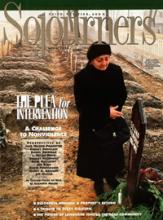A white curtain hung at the right of the stage. On it were written in large letters the words "For thine especial safety." The phrase remained a mystery until Roberta Nobleman appeared and began to tell her story.
She was born in England to a family with few financial resources. She fell in love with the theater as a child, and remembers sitting in the highest balcony with the others who could not afford seats closer to the stage.
The footlights generated a great deal of heat and occasionally caught fire. A fireproof curtain ringed the stage, ready in the event of an emergency. Written on the curtain were the words, "For thine especial safety."
That curtain came to symbolize Nobleman's feeling in the theater. Here was a place that was safe. She had hidden under tables during the bombing raids of World War II and walked through bomb-scarred neighborhoods. Those fearful memories fled as she lost herself in the theater's world of imagination.
But there was another reason the theater represented safety for her: Her home did not. She carried another fear, a more intimate one. Her soldier father had returned from the war when she was 7 years old. That was when the sexual abuse began. It continued until she was 13.
ROBERTA NOBLEMAN pursued her love of the theater as an adult, studying acting, eventually teaching creative drama. Sponsored by the Episcopal Diocese of Western North Carolina, she came to Black Mountain in January as "an actress, storyteller, teacher, and spiritual pilgrim" to share her experience and insight. She spoke to a packed house.
Read the Full Article

